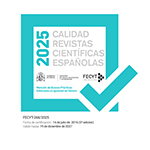In the name of God... and the Republic. Anti-Franco Catholics and the Holy See in the long postwar period (1939-1953)
Abstract
This article deals with the relations, from the end of the Spanish Civil War to the approval of the Concordat and the Madrid Pacts, between the Holy See and the Spanish Catholics who had previously manifested themselves in favour of the Republican side. The study of the documentation of the pontificate of Pius XII accessible in the Vatican and Roman archives, that consulted in American archives and that of some ecclesiastical archives in Spain, allows us to confront questions such as the functioning, dimension and scope of the diplomatic agency developed by the Vatican curia in the face of Franco’s Spain and the Spain of exile; its welfare and spiritual work among the Spanish refugees; or its actions regarding the situation of the political prisoners and the death sentences dictated by the regime. Attention to the multilevel government of the different pontifical agencies involved in the decision-making process shows how the action developed by Montini through the Pontificia Commissione di Assistenza ai Profughi (PCA) and the section of the Secretariat of State in charge of promoting Catholic agenda in international organizations, was surpassed by the nature of the reports presented by Nuncios Cicognani and Roncalli or the subordinates of Domenico Tardini. Most of the time, the measures taken against Catholic militants and clerics opposed to Franco were accepted, more or less enthusiastically, by a Holy See more influenced by the interests of Realpolitik than by the humanitarian principles or the postulates of its spiritual mission.
Downloads
Article download
License
Aquellos autores/as que tengan publicaciones con esta revista, aceptan los términos siguientes:
a. Los autores/as conservarán sus derechos de autor y garantizarán a la revista el derecho de primera publicación de su obra, el cuál estará simultáneamente sujeto a la Licencia de reconocimiento de Creative Commons Reconocimiento-No comercial-Sin obra derivada 4.0 España que permite a terceros compartir la obra siempre que se indique su autor y su primera publicación esta revista.
b. Los autores/as podrán adoptar otros acuerdos de licencia no exclusiva de distribución de la versión de la obra publicada (p. ej.: depositarla en un archivo telemático institucional o publicarla en un volumen monográfico) siempre que se indique la publicación inicial en esta revista.
Plagio y fraude científico
La publicación de un trabajo que atente contra los derechos de propiedad intelectual será responsabilidad de los autores/as, que serán los que asuman los conflictos que pudieran tener lugar por razones de derechos de autor. Los conflictos más importantes pueden darse por la comisión de plagios y fraudes científicos.
Se entiende por plagio:
1.Presentar el trabajo ajeno como propio.
2.Adoptar palabras o ideas de otros autores sin el debido reconocimiento.
3.No emplear las comillas u otro formato distintivo en una cita literal.
4.Dar información incorrecta sobre la verdadera fuente de una cita.
5.El parafraseo de una fuente sin mencionar la fuente.
6.El parafraseo abusivo, incluso si se menciona la fuente.
Las prácticas constitutivas de fraude científico son las siguientes:
1.Fabricación, falsificación u omisión de datos y plagio.
2.Publicación duplicada.
3.Conflictos de autoría.












